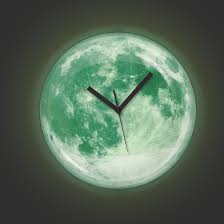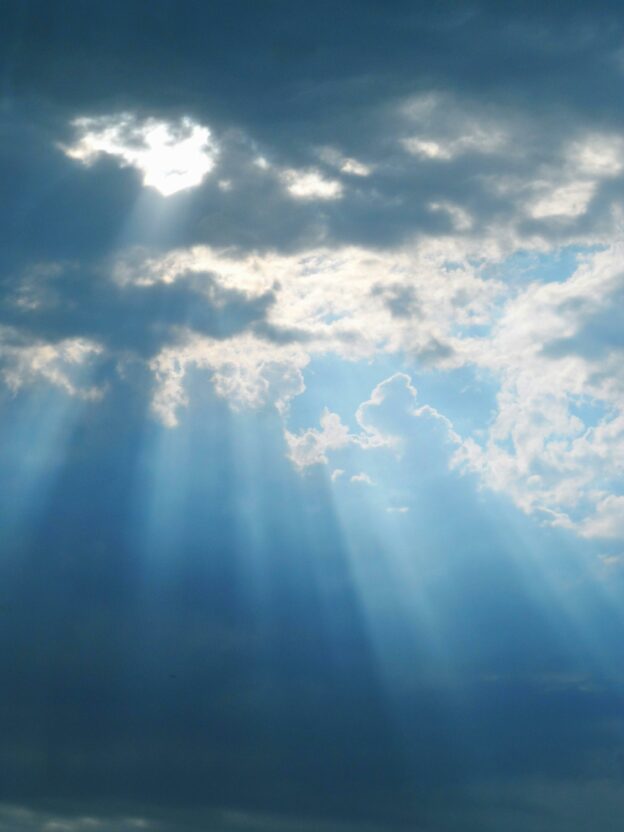A Sukkos-themed piece of mine appears at RNS and can be read here.


A Sukkos-themed piece of mine appears at RNS and can be read here.

As is the case with any question about nature, when a child asks why the sky is blue, the answer one gives (here, that blue light is scattered more than other colors) will elicit a subsequent question of why (because it travels as shorter, smaller waves). And then that answer, in turn, will yield yet another question: Why is that? Eventually, the final answer will always be: “That’s just the way it is!” In other words, it’s Hashem’s will.
Rav Dessler famously explained that every aspect of nature is no less a miracle than a sea splitting, an act of G-d. What we choose to call miraculous is just a divine-directed happening we’re not used to seeing.
The most fundamental element of nature, arguably, is time. The past, from our perspective, is past, and time proceeds relentlessly into the future. But time, too, is a divine creation. Commenting on the Torah’s first words, which introduce Hashem’s creation, “In the beginning…,” the Seforno writes: “[the beginning] of time, the first, indivisible, moment.”
Time is the bane of human existence. The Kli Yakar notes that the word the Torah uses for the sun and moon—“me’oros,” or “luminaries” (Bereishis, 1:16), which lacks the expected vov, can be read “me’eiros,” or “afflictions.”
“For all that comes under the influence of time,” he explains, “is afflicted with pain.”
Rabbi Yitzchak Hutner, zt”l, notes, similarly, that the term “memsheles” (ibid), which describes those luminaries’ roles, implies “subjugation.” For, the Rosh Yeshiva explains, we are enslaved by time, unable to control it or escape its relentless progression. Our positions in space are subject to our manipulation. Not so our positions in time.
But time,, like the rest of nature, can be manipulated, of course, by Hashem’s will. Indeed, as it happens, astoundingly, it can be manipulated by our own as well.
In Nitzavim, which is always read before Rosh Hashana, are the words: “And you will return to Hashem…” (Devarim 30:2).
Teshuvah, Chazal teach us, can change past intentional sins into unintended ones. Even, if the teshuvah is propelled by love of Hashem, into merits (Yoma 86b). Quite a remarkable thought. Chilul Shabbos transformed into reciting kiddush on Shabbos? Eating treif into eating matzah on Pesach? Telling lashon hora into saying a dvar Torah?
By truly confronting our past wrong actions and feeling pain for them, and resolving to not repeat them, we can reach back into the past and actually change it. We are freed from the subjugation of time. Is that not the temporal equivalent of the splitting of a sea?
Which thought might well lie at the root of the larger theme of freedom that is so prominent on Rosh Hashana. Tishrei, the month of repentence, is rooted in “shara,” the Aramaic word for “freeing”; the shofar is associated with Yovel, when servants are released; we read from the Torah about Yitzchak Avinu’s release from his “binding”; and Rosh Hashanah is the anniversary of Yosef’s release from his Egyptian prison, and of the breaking of what can be thought of as Sarah and Chana’s childlessness-chains.
And that ability to manipulate time may be why, on Rosh Hashanah, unlike on every other Jewish yomtov, the moon, the “clock” by which we count the calender months of the year, is not visible. The moon is, famously, a symbol of Klal Yisrael. It receives its light from the sun, just as we receive our enlightenment, and our mission, from Hashem; it wanes but waxes again, as Klal Yisrael does throughout history.
The subtle message in the moon’s Rosh Hashana invisibility may be the idea that time need not limit us, if we successfully engage the charge of the season. We are guided to imagine that the sky, with its missing “Jewish clock,” is reminding us, at the advent of the Aseres Yimei Teshuva, that time can be overcome in an entirely real way, through the Divine gift of teshuvah, powered by our heartfelt determination.
Ksivah vachasimah tovah!

We read parshas Bamidbar (Bimidbar, if one wants to be didactic) on the Shabbos before Shavuos. The meaning of that juxtaposition might lie in the word by which the parsha is known ((however one chooses to render it).
Rav Yisrael Salanter saw a trenchant message in the fact that Shavuos, unlike Pesach and Sukkos, has no set date. Tied as it is to the beginning of the Omer count on the second day of Pesach, its 50th day – at least when Rosh Chodesh was dependent on the sighting of new moons – could have fallen on the 5th, 6th or 7th day of Sivan.
Rav Yisrael explained that since we know that Shavuos is zman mattan Toraseinu (note zman, not yom, as the holiday may not fall on the date of Sivan on which the Torah was actually given), its lack of an identifiable set day telegraphs the idea that Torah is unbounded by time. On a simple level, that means it applies fully in every “modern” era; on a deeper one, that it transcends time itself, as per Chazal’s statement that it was the blueprint of the universe that Hashem, so to speak, used to create creation.
A parallel message, about space, may inhere in the desert, a “no-place,” being the locus of Mattan Torah. Here, too, there is a simple idea, that Torah is not bound to any special place but rather applies in all places; and a deeper one, that it transcends space itself, which, like time, is in the end something created.
That time and space are not “givens” of the universe, but, rather part of what was created at brias ha’olam (aka the “Big Bang) is a commonplace today, although it wasn’t always so, as philosophers maintained over centuries that there was never any “beginning” to the universe and that space is a fixed, eternal grid.
© 2025 Rabbi Avi Shafran

The term “afilu biShabbos shel chol” – “even on a weekday Shabbos” – is from the Zohar (Korach 179), as the end of the statement beginning: “The Shechinah has never left Yisroel on Shabbosos and Yomim Tovim…”
“Weekday Shabbos”? It has been suggested, by the Parshas Derachim (Rav Yehudah ben Rav Shmuel Rosanes) in the name of his father that the strange statement refers to the situation presented by the Gemara (Shabbos 69b) of a Jew who is lost in the desert, and who has lost track of the day of the week. There, Rav Chiya bar Rav maintains that the person should observe the next day as Shabbos and then count six days before again observing Shabbos. Rav Huna argues that he should first count six days and only then observe the first Shabbos.
In both opinions, though, a weekday could (and most likely would) end up “being” Shabbos.
The Chasam Sofer sees a hint to that approach in the fact that, in our parsha (Vayikra 23:2-3), Shabbos is counted along with holidays – as part of the mikraei kodesh (“those declared as holy”), which refers to the fact that Jewish holidays are “declared,” dependent on when the beis din announces each new month. Thus they are dependent on Jews’ actions, unlike Shabbos, which is set from the creation week and impervious to human intervention.
Except, that is, in the case of the desert wanderer. In that case, the wanderer indeed declares when Shabbos is. And the Shechinah descends on his “weekday Shabbos.”
Evidence, it would seem, of the profound power the human realm wields, able as it is to “summon” the Shechinah to descend.
Hashem has made us partners in Creation. A timely thought as Shavuos (during the month of Sivan, whose mazal is te’umim) approaches.
© 2025 Rabbi Avi Shafran

A Pesach-themed piece I wrote for the Boston Globe can be read here.

Last Thursday, explosives destroyed three buses in Israel – empty ones. Yesterday, Nael Obeid, a notorious Hamas terrorist who was freed in a hostage exchange, fell to his death in East Jerusalem. As we prepare to welcome Adar, we pray for Hashem’s continued protection.

I’ve long fixated on a phrase Yisro uses. When he rejoins Moshe and joins Klal Yisrael, he declares why, although he had been a guru in countless cults, he came to the conclusion that “Hashem is greater than all the powers.”
“Because,” he explains, “of the thing that [the Mitzriyim] plotted against them [i.e. Klal Yisrael]” (Shemos 18:11).
Rashi, in explanation, cites the Mechilta: “… the Mitzriyim thought to destroy Yisrael by water and they were themselves destroyed by water.” And he quotes Rabi Elazar (Sotah 11a), punning on the word “plotted,” which can also mean “cooked,” that “in the pot that they cooked up they ended up being cooked.”
What strikes me is that it is irony – here, that the means the Mitzriyim employed to kill Jews ended up as the agent of their own downfall – that moves Yisro to perceive the Divine hand.
It is such a Purim thought. In Megillas Esther, too, although Hashem’s name is entirely absent, His hand is perceptible through the irony that saturates the story: Haman turns up at just the wrong place at just the wrong time, and ends up being tasked with arranging honors for his nemesis Mordechai. All the villain’s careful planning ends up upended, and he is hanged on the very gallows he prepared for Mordechai. Haman’s riches, according to the Book of Esther, were given to Mordechai. V’nahafoch hu, “and it was turned upside down.”
Amalek may fight with iron, but he is defeated with irony.
Shortly after Germany’s final defeat in WWII, an American army major, Henry Plitt accosted a short, bearded artist painting on an easel in an Austrian town and asked him his name. “Joseph Sailer,” came the reply.
Plitt later recounted: “I don’t know why I said [it, but] I said, ‘And what about Julius Streicher?’” – referring to the most vile and antisemitic of Nazi propagandists.
“Ya, der bin ich,” the man responded. “Yes, that is me.” And it was.
A reporter later told Major Plitt that, had only “a guy named Cohen or Goldberg or Levy… captured this arch-anti-Semite, what a great story it would be.”
Major Plitt, in fact, was Jewish.
Stars and Stripes in late 1945 reported that Streicher’s possessions were converted to cash and used to create an agricultural training school for Jews intending to settle in Eretz Yisrael.
And when Streicher was hanged at Nuremberg in 1946, his final words, shouted just before the trap sprang open, were: “Purim Fest 1946!” – a rather odd thing to say on an October morning.
© 2025 Rabbi Avi Shafran

I’ve always found it delightful that the term we use for when the amniotic sac ruptures, releasing the fluid within and beginning the birth process, is “breaking of the waters.” Because the birth of the Jewish nation, after its gestation for centuries in Mitzrayim, also involved the “breaking” of the waters of the Yam Suf.
The comparison is not whimsical. A newborn is empty of worldly experiences and intelligence, unable to speak or move in willful ways. What it is, though, is a dynamo of potential. So was the nation that was comprised of our ancestors. They had sunk to the penultimate rung of tum’ah in Mitzrayim and they still pined, when trapped at the sea, to return to their nation-prison. Their worthiness lay in their potential, which began to emerge weeks later at Har Sinai.
The Maharal (in his Gur Aryeh supercommentary on Rashi [Beraishis 26:34] and in his sefer Ner Mitzvah) assigns a stage of human life to each of the year’s seasons. We tend to associate nature’s awakening in spring with childhood, the heat of summer with petulant youth, autumn with slowed-down middle age and cold, barren winter with life’s later years.
The Maharal, however, describes things differently. He regards autumn, when leaves are shed and nature slows down, as corresponding to older age; summer’s warmth, to our productive middle-years; spring, to reflect the vibrancy of youth. And winter, to… childhood.
It seems counterintuitive, to put it mildly. Winter is, after all, stark, empty of vibrancy, activity and growth. Childhood is, or should be, full of joy, restlessness and development.
But spring’s new plants and leaves don’t appear suddenly out of nothingness. The buds from which they emerge were developing for months; the sap in the seemingly dormant trees was rising even as the thermometer’s mercury fell. The evidence of life that presents itself with the approach of Pesach was developing since Chanukah. In the deadest days of deepest winter, one can see branches’ buds, biding their time, readying to explode into maturity when commanded.
Winter, in other words, evokes potential. And so, what better metaphor could there be for childhood, when the elements that will emerge one day and congeal into an adult roil inside a miniature prototype? When chaos and bedlam may seem to be the norm but when potential is at its most powerful? “The Child,” after all, as Wordsworth famously put it, is indeed “father of the Man.” Every accomplished person was once an unbridled toddler.
And we read of the potential that lay in our ancestors at the “breaking of the waters” of the sea while winter still envelops us. And as the days are few until Tu B’Shvat, the Rosh Hashanah of the trees.
© 2025 Rabbi Avi Shafran

When one thinks about it, it’s clear that the Torah’s most fundamental message is that our lives are meaningful. That what we do makes a difference. And when one thinks about it a bit more, one realizes that the idea – that we are powerful enough for our actions to count in the cosmos – is really most shocking.
It’s a truth, unfortunately, that’s not embraced by a considerable chunk of humanity, by countless people who choose to view their existence as nothing more than the product of a long series of meaningless, chance happenings. And what they do or don’t do, as essentially meaningless.
I have often wondered how, despite that delusive belief, such rejecters of human purpose justify their glaringly contradictory claim that ethics or morality exist. If humans are not qualitatively different from amoebas, why should there be any more meaning to good and bad actions than to good or bad weather? Why should there be any more import to right and wrong than to right and left?
Some of the “we’re all just the detritus of random events” crowd try to deflect those starkly obvious questions by invoking the idea of a “social contract,” the agreement of all people to behave a certain way in order to ensure everyone a greater likelihood of survival and happiness.
But a social contract, to the extent that it can actually work, is at best only a practical tool, not a serious imperative. Only if there is a Creator in the larger picture, offering our behavior consequential meaning, can there be true import to human life, placing it on a plane above that of aphids and aardvarks.
Even from a purely secular perspective, seeing life itself, let alone human life, as the product of chance is absurd. Sir Fred Hoyle, who was a famed astronomer but also a deep thinker about science, called the notion of life’s random emergence “nonsense of a high order.” He embraced no religion but felt compelled nonetheless to compare the likelihood of the random emergence of life to that of “a tornado sweeping through a junk-yard… [and] assembl[ing] a Boeing 747 from the materials therein.”
The recognition of human life’s momentousness is poignantly pertinent to Yom Kippur.
Because, when the Beis Hamikdosh stood, as we recount and envision during our Yom Kippur tefillas Musaf, two indistinguishable goats were brought before the Kohein Gadol, who placed randomly-pulled lots on the heads of the animals. One lot read “to Hashem” and the other “to Azazel” – the name of a steep cliff in a barren desert.
The first was offered as a holy korban; the second, taken to the aforementioned cliff and thrown off, dying unceremoniously, as the Mishna (Yoma 6:6) recounts, battered to pieces before even reaching the bottom.
The goat that is brought as a korban – the word means “closeness maker,” as it brings the offerer closer to Hashem – implies recognition of the idea that we mortals are beholden to a divine mandate. And the counter-goat, fated to a desolate, unholy place, may imply a perspective of life as pointless, lacking higher purpose.
Strangely, the Azazel-goat is described by the Torah as carrying away Klal Yisrael’s sins. What might that mean?
Consider: The ability to sin stems from not fully realizing how meaningful our lives are; if we truly felt the power that inheres in our actions, we could never do wrong. Resh Lakish in fact said as much when he observed (Sotah 3a) that “A person does not sin unless a spirit of madness enters him.” Sin’s roots lie in the madness born of our doubting our significance.
And so it’s not outside the realm of the reasonable to imagine that the sight of the doomed-to-Azazel goat being led to an aimless, arbitrary death – the opposite of its erstwhile partner’s honored, sacred one – might serve to remind us of the stark difference between the two diametric attitudes toward human life.
Pondering our lives’ meaningfulness on the holiest day of the Jewish year would thus be most appropriate, generating thoughts of teshuvah, of re-embracing the truth of our power Hashem has given us, “carrying away” our sins.
G’mar chasimah tovah.
© 2024 Ami Magazine

You probably think that there isn’t anything that an impending presidential election might have to say to us about the aseres yimei teshuvah. Ah, but there is.
Those of us old enough to have been observers of politics back in 2004 might recall the now largely-forgotten “Dean Scream.” Howard Dean, then the governor of Vermont, was seeking the Democratic nomination for President. He blew his chances in a matter of seconds.
It was at the end of an address that, in an attempt to show his enthusiasm, he let loose a roar somewhere between a jihadi war cry and a leafblower. That decision to express himself in that way left the public – a public that, at the time, still expected a degree of decorum from candidates – wide-eyed with something other than wonder. Some called it the candidate’s “I Have a Scream” speech.
Then there were other blown-in-a-moment presidential campaigns, like that of Maine governor and four-term Senator Edmund Muskie, who, in 1972, defending his wife’s reputation, seemed to shed tears, which some American voters felt disqualified him. There was also Gary Hart’s 1988 marital indiscretion (ah, times were so different back then) and, the same year, Michael Dukakis’s donning of an ill-fitting combat helmet, which helped sink his bid for the White House.
See where I’m going? No? Understandable. Let me spell it out.
Every one of us, too, in our personal lives, comes face to face at times with opportunities of our own that, wrongly handled, can lead to places we don’t want to go. And, rightly handled, benefit our spiritual growth.
And we are vying for something much more important than a mere nomination for public office. We’re in the race to fulfill our missions in this world.
In the bustle of everyday life, it is all too easy to forget that decisions we make, sometimes almost unthinkingly, might be crucial ones, that seemingly minor forks in the roads of our lives can, as Robert Frost famously put it, make all the difference.
Seizing an opportunity to do something good changes one’s world. Letting the opportunity go by unaddressed – which is also choice, after all – does the same. Offering an encouraging word can make a great difference. Doing the opposite can be as self-destructive as Howard Dean’s scream.
As Chazal teach us, “One can acquire his universe” – the one that counts: the world-to-come – or, chalilah, “destroy” it “in a single moment.”
We can even, through sheer determination, create our own critical moments. Consider the case of the “conditional husband.”
A Jewish marriage is effected by the proposal of a man to a woman – the declaration of the woman’s kiddushin, or “specialness” to her husband – followed by the acceptance by the woman of a coin or item of worth from her suitor. If the declaration is made on the condition that an assertion is true, the marriage is valid only if the assertion indeed is. Thus, if a man betrothes a woman on the condition that he drives an electric car, or still has his own teeth, unless he does, they aren’t married.
The Gemara teaches that if a man conditions his offer of marriage on the fact that he is “a tzaddik,” even if the fellow’s reputation isn’t flawless, the marriage must be assumed to be valid (and requires a gett to dissolve it).
Why? Because the man “may have contemplated teshuvah” just before his proposal.
That determined choice of a moment, in other words, if sincere, would have transformed the man completely, placed him on an entirely new life-road. The lesson is obvious: Each of us can transform himself or herself – at any point we choose – through sheer, sincere will.
And potentially transformative situations that present themselves are hardly uncommon. When we make a decision about where to live or what shul to attend – not to mention more obviously critical decisions like whom to marry or which schools our children will attend – we are defining our futures, and those of others. We do ourselves well when we recognize the import of our decisions, and accord them the gravity they are due.
Ksiva vachasima tovah!
© 2024 Ami Magazine